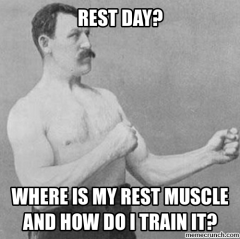|
Whether you're following specific macronutrient targets (which are necessary for optimal progress) or not, this tip should be incredibly intuitive: the more energy you expend on a given day, the more calories you need, and vice versa. All too often, though, people get slapped upside the head with a change to their daily schedule, panic, and throw up their hands thinking their entire day is lost.
"I can't train today because I got called into work at the last second. All my gainz will be lost..." This is simply not true. If you even find yourself in the position where a scheduled training day becomes an impromptu rest day, a very simple adjustment to your macros can be made in order for you to accommodate this change. With myself & all of my clients, I employ Calorie Cycling in the diet. Once we calculate the desired level of energy intake across the week, then we can go about shuffling those calories around to allow more on training days where they can be "put to good use." Think of strength training as a way to encourage proper utilization of the food you ingest; you're going to want more calories in the window around training as opposed to outside of it, and the length of this window changes with your training status (but that's beyond the scope of this blog post). What this boils down to is setting effective minimums for your macro targets on rest days which will keep you in line with this principle. Every trainee should utilize this approach in order to encourage fat loss on their days outside of the gym & lean mass gain on their days spent in the gym. You can do both at the same time; it's not magic, it's fact. Let's use an example to illustrate the point: Scott wants to gain muscle while losing fat. He is carrying about 18% body fat, which is about average for a male. Since he's an "intermediate" trainee, he trains 5 days per week, leaving 2 days as "planned" rest days. When we calculate his desired energy intake over the course of the week to account for his goals, we find that 17000 calories will allow him to stay in the desired energy deficit across the entire week. *Side Bar: Daily calorie intake means next to nothing when you're not considering the bigger picture, which is why we need to take a step back and look at weeks (or even months) at a time.* In this example, Scott can easily afford to eat 3000 calories on training days, with the majority of that energy coming around his training time. This amounts to 15000 of his weekly calories. The remaining 2000 can simply be split up on his rest days, leaving 1000 calories per rest day. Care must be taken to ensure Scott is still taking in enough protein on these rest days, so we set that value to reflect his training days. But the remaining handful of calories can be split up in almost any fashion between carbs & fats with no issue, so long as he's meeting his weekly calorie goal & subsequent weekly macro targets. This is all well & good, but what happens if Scott can only train 4 days this week instead of his planned 5? He simply uses his rest day calorie & macro targets. There's no reason for him to eat 3000 calories on a day when he won't be expending nearly that much energy. Yes, this decreases his weekly calorie intake, but the unplanned rest day also decreases his weekly energy expenditure in the same manner. By dropping his calories in this scenario, we're simply pairing the two together, which is the entire premise. By having this extra rest day, Scott may find he loses a little more weight than what was estimated for this given week, but we can be fairly certain that this extra drop on the scale came from fat loss & not muscle loss. Remember, he's maintaining an adequate protein intake even on his rest days, which encourages the maintenance of lean mass. And as an intermediate, his "Anabolic Window" of increased nutrient utilization is much shorter in response to training than it would be for a newbie lifter. Therefore, the recommendation for him to eat less on rest days is even more warranted. Before you say "that sounds drastic," know that Calorie Cycling in this fashion actually aids compliance to your diet. By having a larger deficit on rest days, those days actually feel like ones that encourage positive results instead of "useless days waiting to get back in the gym." This often shows up on the scale the following morning: you're almost guaranteed to be lighter on days following rest days, which has almost always been true in my own experience. If you don't shift your calories at all & employ a large deficit on all days to "crash diet," every day will seem like a nightmare. By shuffling them around, you have days where you earn more calories & days where you don't, and both kinds of days contribute to the goal of better body composition. So if your schedule takes a turn & keeps you out of the gym every now & again, accommodate accordingly. Reduce your calorie intake to encourage fat loss & stay in line with your desired energy balance. One extra day of eating grilled chicken & broccoli isn't going to kill you; it will actually allow you to progress faster. And that's the goal.
0 Comments
Leave a Reply. |
Categories
All
DisclaimerThe techniques, strategies, and suggestions expressed in this website are intended to be used for educational and entertainment purposes only. The author is not rendering medical advice of any kind, nor is this website intended to replace medical advice, nor to diagnose, prescribe or treat any disease, condition, illness or injury. |


